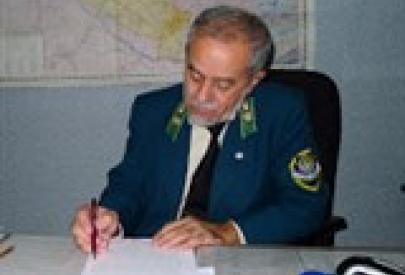Alexander A. Grigoryants, State Biocontrol Department, Nature Protection Committee, Republic of Uzbekistan

Alexander Grigoryants is acting head of the State Biocontrol Department of the Nature Protection Committee of the Republic of Uzbekistan. He has worked on the protection of Uzbekistan's unique natural heritage for many years. He is also in charge of the implementation of international conventions including CITES and CMS, which cover saiga conservation actions.
The editor of Saiga News interviews Alexander Grigoryants
The most striking memorable moments of his career are connected with his operational work combatting poaching.
Editor: When did you first take an interest in the saiga?
Since my childhood I have always been very much interested in the life of wild animals and when I saw a saiga in a picture (I do not actually remember when), its unusual appearance really amazed me. But I began to take a keen interest in this species when I started work at the Inspectorate in 1976.
Editor: What is your ordinary day like?
Currently I have to do a lot of administration and paperwork. I constantly meet with different people who come to our organization to discuss various issues; if our staffs are unable to resolve these problems at their level, than I have to get involved in solving them. Most regrettably, currently I do very little operational, inspection work.
Editor: Can you tell us any interesting story about the saiga?
I encountered saigas very often when I was engaged in operations. There were many different situations, yet it was just my work, I did not perceive it as something extraordinary.
Editor: What are the main problems in your work?
The main problems include: technical equipment of the inspectors, staff training, developing additions and amendments to the law with regard to the strengthening of controls over the use of natural resources.
Editor: How can be the obstacles to your work be removed?
Awareness about conservation should be enhanced among decision-makers. In addition, we need to educate them about conservation. The politicians and economists must understand that it is easier and better to invest millions in nature conservation today than invest billions in restoration of the environment in the future.
Editor: What is the best thing in your work?
The very best thing is that I enjoy this work and would like to do everything in my power to improve the situation for nature conservation.
Editor: What are prospects for saiga conservation? What needs to be done first of all to help this species survive?
Many years ago the saiga was also on the verge of annihilation but severe laws helped it to recover. We need to attract attention to the issue of conservation, strengthen legislation, raise awareness among local people and strictly comply with the requirements of the law. I am sure we will manage to restore saiga numbers.
Editor: You have worked in conservation for many years. What has changed over these years and what are current tendencies in this sphere?
Yes, I have worked in this field for rather a long time and can say that a tendency for the better is starting to show. Many more people are beginning to understand that conservation is not just a folly of some fanatics, but that it is a vital necessity for the preservation of life on Earth, our shared Earth. Nature does not have borders and many, including politicians, are beginning to realize this. I believe that this will lead directly to a significant improvement in nature conservation in the near future.
